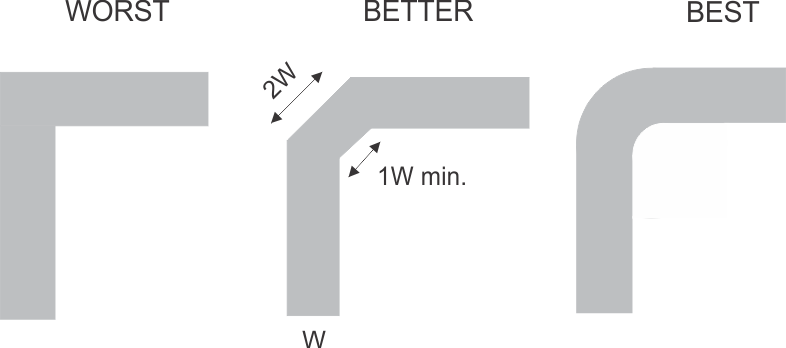SCDS457B May 2023 – July 2024 TMUX4827
PRODUCTION DATA
- 1
- 1 Features
- 2 Applications
- 3 Description
- 4 Pin Configuration and Functions
- 5 Specifications
-
6 Parameter Measurement Information
- 6.1 On-Resistance
- 6.2 On-Leakage Current
- 6.3 Off-Leakage Current
- 6.4 Power-Off Leakage Current
- 6.5 Propagation Delay
- 6.6 tON (VDD) and tOFF (VDD) Time
- 6.7 Transition Time
- 6.8 Break-Before-Make
- 6.9 THD + Noise
- 6.10 Power Supply Rejection Ratio (PSRR)
- 6.11 Charge Injection
- 6.12 Bandwidth
- 6.13 Off Isolation
- 6.14 Crosstalk
- 7 Detailed Description
- 8 Application and Implementation
- 9 Device and Documentation Support
- 10Revision History
- 11Mechanical, Packaging, and Orderable Information
Package Options
Refer to the PDF data sheet for device specific package drawings
Mechanical Data (Package|Pins)
- YBH|9
Thermal pad, mechanical data (Package|Pins)
Orderable Information
8.4.1 Layout Guidelines
When a PCB trace turns a corner at a 90° angle, a reflection can occur. A reflection occurs primarily because of the change of width of the trace. At the apex of the turn, the trace width increases to 1.414 times the width. This increase upsets the transmission-line characteristics, especially the distributed capacitance and self-inductance of the trace which results in the reflection. Not all PCB traces can be straight and therefore some traces must turn corners. Figure 8-3 shows progressively better techniques of rounding corners. Only the last example (BEST) maintains constant trace width and minimizes reflections.
 Figure 8-3 Trace
Example
Figure 8-3 Trace
ExampleRoute high-speed signals using a minimum of vias and corners which reduces signal reflections and impedance changes. When a via must be used, increase the clearance size around it to minimize its capacitance. Each via introduces discontinuities in the signal’s transmission line and increases the chance of picking up interference from the other layers of the board. Be careful when designing test points, through-hole pins are not recommended at high frequencies.
Some key considerations are as follows:
- For reliable operation, connect a decoupling capacitor ranging from 0.1µF to 10µF between VDD and GND. TI recommends a 0.1µF and 1µF capacitor, placing the lowest value capacitor as close to the pin as possible. Make sure that the capacitor voltage rating is sufficient for the supply voltage.
- Keep the input lines as short as possible.
- Use a solid ground plane to help reduce electromagnetic interference (EMI) noise pickup.
- Do not run sensitive analog traces in parallel with digital traces. Avoid crossing digital and analog traces if possible, and only make perpendicular crossings when necessary.
- Using multiple vias in parallel will lower the overall inductance and is beneficial for connection to ground planes.